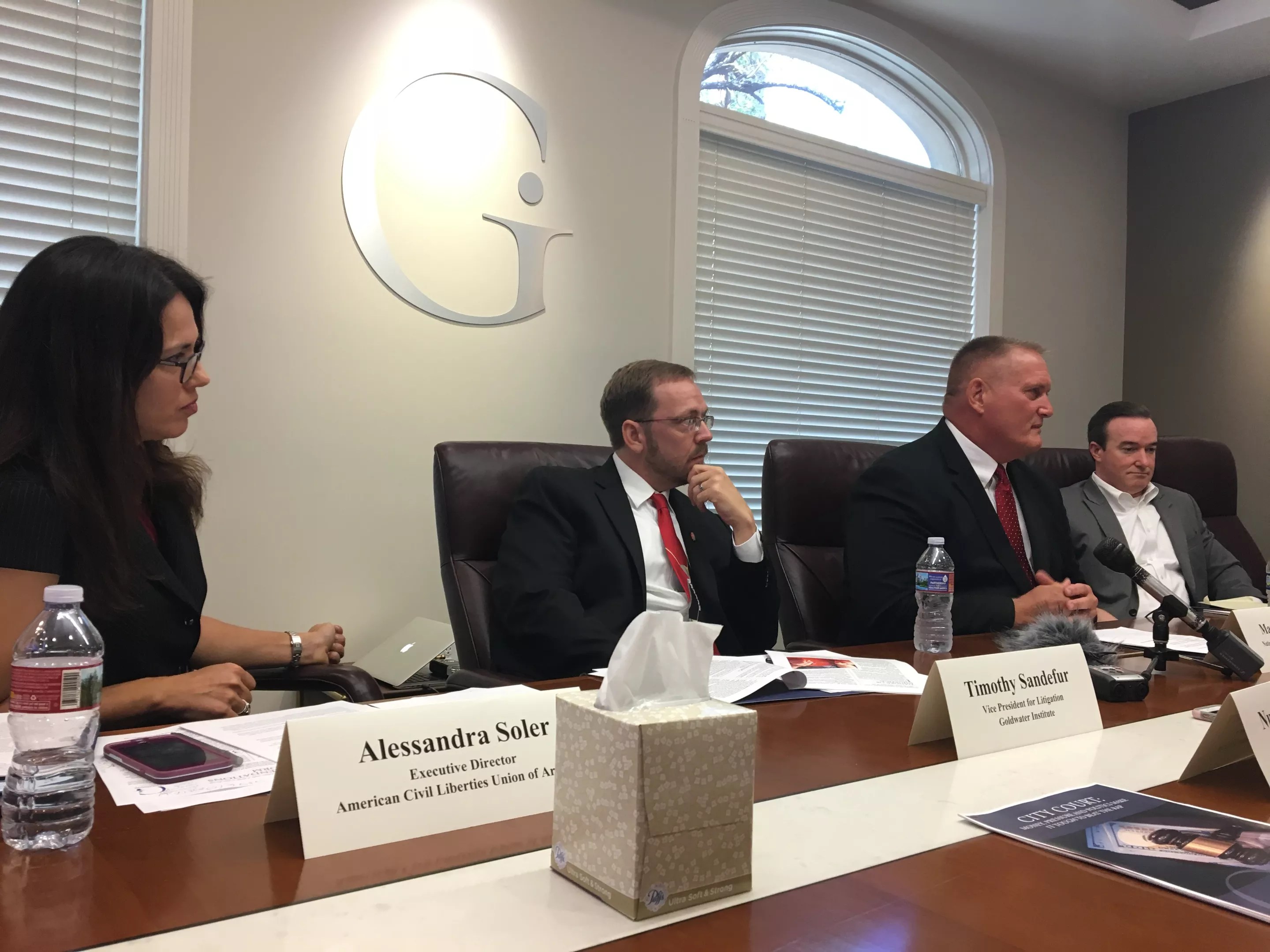
Brian Turner/Flickr

Audio By Carbonatix
It’s not the fight of the century, but your money may be riding on it, anyway.
Several city courts are pushing back on a report from the libertarian Goldwater Institute that said some Arizona municipal courts bring in millions of dollars from fines and fees. Tempe, Scottsdale, and Paradise Valley all released statements in response to the report, defending their fines and fees procedures.
Take a ringside seat as we analyze the rhetorical right hooks.
Round One: Dollars and Sense
Tempe punched back after Goldwater said the city expects to bring in revenue in excess of $8 million in revenue this year from its court operations. That figure, they say, contains much more than court fines; included is “money the city collects for false alarm fines, building code enforcement violation fines, ambulance operations, subscription payments to the city’s Service Line Protection Program (SLiPP), and more.”
The city said $4.1 million is the actual revenue from the court. When you factor in their expenses of $4.8 million, their ratio of revenue to expenses is a negative one.
A Tempe spokesperson said fines unrelated to a municipal court case follow an administrative appeals path if a resident wants to contest the fine, but appeals of other fines, such as traffic violations and civil/criminal code violations, would land in city court.
The report’s author, Mark Flatten, said that the institute stands by its findings, because the fines and forfeits category is the standard category in which cities report court revenue.
Flatten said in a written response to Tempe’s concerns, “Judges and budget officials I spoke to in every other city said that line is the best representation of the amount of court-related revenue that goes into the general fund. While there may be some other incidentals, virtually all of that money is supposed to be from court-related activities.”
And Flatten reiterated the report’s conclusions, which argued that the municipal court system undermines due process because municipal judges are almost always appointed by city councils, not elected.

Representatives for the Goldwater Institute and the American Civil Liberties Union discuss municipal court reform at a press event on July 18.
Joseph Flaherty
Which leads to another point of contention …
Round Two: Thumb on the Scale
The institute argued that the subtle influence of city councils on judges can sway cases adjudicated in city courts, or can lead to an uptick in revenue when judges are involved in budgetary or revenue discussions.
Tempe’s mayor disagrees.
“The Tempe City Council respects the need for a fair, independent Tempe Municipal Court. We have not and would not influence the operations of the court to increase revenue,” Mayor Mark Mitchell said in the city’s statement. “We hire highly qualified, impartial judges through a public process, and we have every confidence that’s exactly who we have at the Tempe Municipal Court today.”
But Flatten argues that political influence may be hard to detect, such as when judges sit in on discussions of court revenue. “Every judge will tell you political pressure is not a factor,” he wrote.
“The point of the story is not that this judge or that council is bad,” Flatten added. “It’s that we have a system in Arizona that makes these judges vulnerable to political influences, whether overt or subtle.”
Round Three: Crime and Punishment
Political factors aside, special circumstances could result in lots of court revenue for several cities. Paradise Valley and Scottsdale, which are also among the top-earning court systems, defended their fine and fee practices.
Even the Goldwater Institute admitted that there are unique aspects to these cities that are hauling in cash from their court systems. Scottsdale and Paradise Valley are wealthier communities, Flatten said, and Tempe has a huge student population: It’s almost a city-within-a-city.
“Scottsdale and Paradise Valley tend to be more affluent communities and very often people can write a check and make the nuisance go away. There are probably not that many in Paradise Valley that can’t pay their fines,” Flatten told New Times. “A huge factor in both of those cities is photo-enforced radar,” he added.
For their part, Scottsdale and Paradise Valley courts released statements saying their fines and fees are within the range of other cities, and are approved by the Arizona Superior Court. These municipalities also cited programs that allow alternatives to paying fines, such as community service.
“They’re all moving in the direction of the Justice for All Taskforce recommendations, and that’s all well and good,” Flatten said. “But that doesn’t fix the underlying problem that these city court judges are answering to city councils and not to the public.”
To be clear, not everyone agrees with the Flatten’s call for electing municipal judges.
Phoenix public defender Gary Kula told New Times recently that he firmly disagrees with the institute’s recommendation. Elections, he said, could make the problem worse.
“I think if we’re looking for judges who are doing the right thing because it’s the disposition in the case, the last thing we want is an election where the person promises to be the toughest on crime and imposes the highest fines and a lengthy jail sentence,” Kula said. “We want people who make decisions based on what is right and what is just.”
There might not be a single solution for municipal court practices that unfairly target low-income individuals. Nevertheless, Flatten said insulating judges from pressure is a necessary first step; without it, payment plans and community service alternatives won’t fix the underlying problem so long as judges are concerned with revenue outcomes.
“You can fix some of the symptoms without fixing the system, but, ultimately, you’ve got to look at fixing the system,” Flatten said.